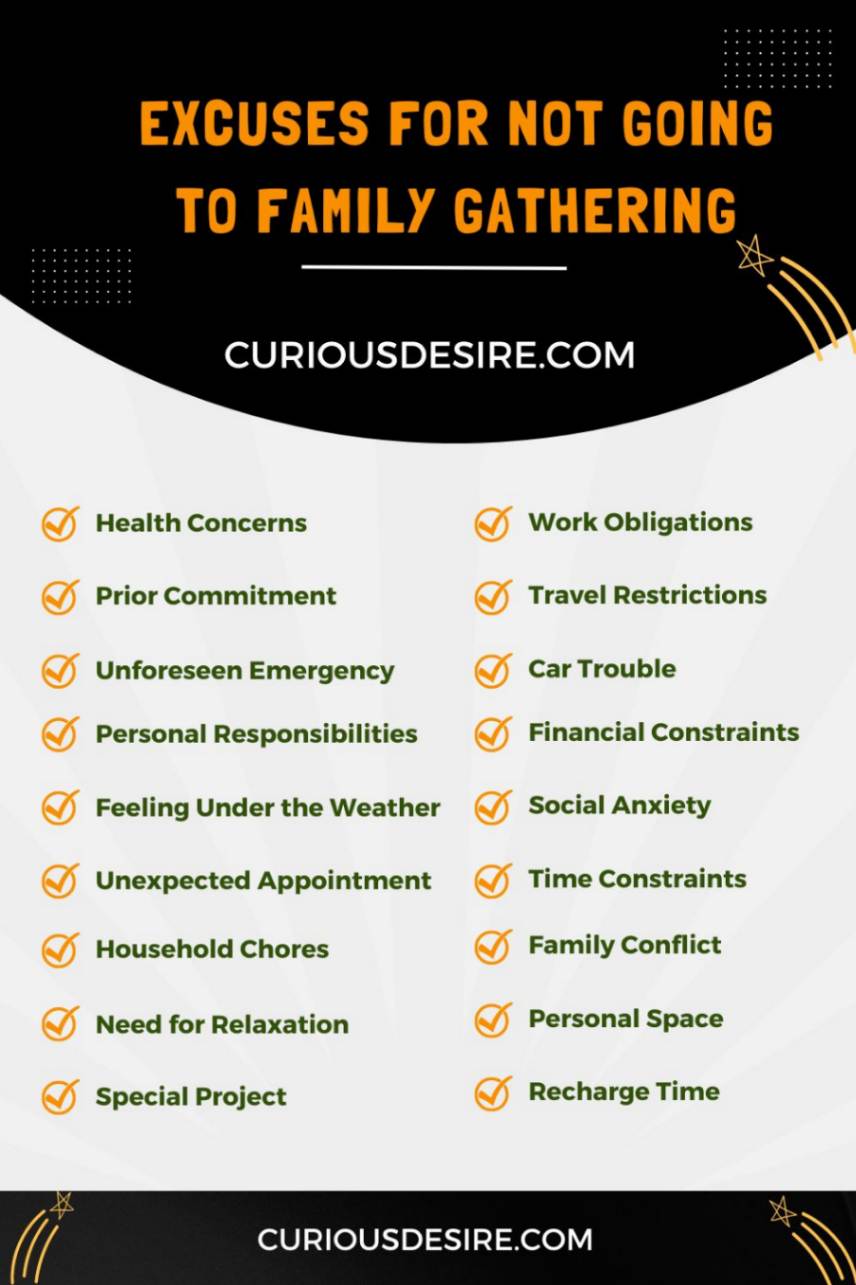Family gatherings are special moments that bring us closer, creating memories to cherish. Spending time together strengthens our bonds and adds joy to our lives.
However, life is full of unexpected twists, and sometimes we find ourselves in situations where joining these gatherings becomes a challenge.
In these moments, explaining our reasons becomes important to promote understanding and maintain the love that defines our family connections.
Let’s explore the significance of family gatherings and those unexpected situations that can sometimes keep us from being present.
Here are the 5 most common excuses for not going to family gatherings:
- Health concerns
- Work obligations
- Prior Commitment
- Unexpected appointment
- Car trouble
1. Health Concerns
Sometimes, we may not feel up to attending family gatherings due to health concerns. It could be a minor illness like a headache or fatigue, or even a more significant health issue.
The consequences of pushing through could worsen our condition or spread illness to others. For example, saying, “I’m not feeling well” might help you avoid spreading germs.
However, it’s important to communicate and assure your family that you’ll join them next time. Alternatively, you can suggest catching up through a video call to stay connected without risking anyone’s health.
2. Prior Commitment
At times, we might have a prior commitment that prevents us from attending family gatherings. This could be an existing engagement, plans with friends, or even a long-standing personal commitment.
For instance, if you have a friend’s birthday party, explaining, “I have a prior commitment” allows you to stick to your existing commitments.
To compensate, consider arranging a separate time to spend with family and highlight the importance of respecting prior commitments.
3. Work Obligations
Think of work obligations like promises we make at our jobs. They’re important because they help us earn a living and build our careers. Imagine your boss giving you a special project; completing it well might lead to recognition or a step forward in your career.
On the flip side, not meeting these work obligations could mean missed opportunities or even job uncertainty. So, when I say, “I have work obligations,” it’s like saying, “I need to focus on my job right now.”
But let’s find another time to catch up and spend quality moments together when work isn’t pulling me in so many directions.
https://www.youtube.com/watch?v=ZMbNSAYa_c8
4. Personal Responsibilities
Occasionally, individuals may have important tasks at home, such as caring for a pet or managing household chores. Failing to address these responsibilities can lead to inconveniences or added stress.
For instance, if there are important tasks at home, it’s important to give them proper attention. Balancing personal responsibilities and family time is key to a smooth routine.
This might involve suggesting alternatives, like rescheduling the family event or finding a compromise, to make sure both personal responsibilities and family commitments are successfully met without causing unnecessary pressure.
5. Travel Restrictions
Sometimes, it’s hard to go to family gatherings because of travel issues, like being far away or having problems with transportation. This can happen when there’s a lot of traffic or during a lockdown.
These issues could be because of no available transport or personal reasons. It’s important to tell your family about these challenges and explain how tough it is to make the journey.
To keep the family close, you can suggest other ways to stay connected, like having a video call or planning to visit when travel gets easier. This way, even if you can’t be there physically, you can still be a part of the family moments.
6. Unforeseen Emergency
In unexpected situations like emergencies, attending family gatherings may become impossible. Emergencies could be anything from someone suddenly falling ill to unforeseen issues that need urgent attention.
For example, if a family member has a sudden health crisis, it becomes important to address the situation quickly. It’s important to explain the nature of the emergency without giving too many details if it’s personal.
Communicate the need to deal with the situation urgently and reassure your family that you would have attended if circumstances were different.
7. Need for Personal Space
Sometimes, we all need some alone time. It’s important to tell your family openly that you need personal space. Make sure they know it’s not about avoiding them; you just need a bit of time to yourself.
Let them know that you’ll be ready for family time later. It’s like saying, “I need a break for now, but let’s plan to spend time together when I feel more energized.” This way, your family understands, and it helps make your relationships stronger.
8. Feeling Under the Weather
There are times when we feel unwell, and attending family gatherings becomes challenging. It could be due to a mild illness, fatigue, or just not being at our best.
For example, if you have a cold or a headache, it’s like feeling tired and not wanting to socialize. Instead of going out, it’s important to take care of yourself.
You might say, “I’m not feeling great today,” and suggest rescheduling the gathering once you’re feeling better. This way, you let your family know you need some rest and still find a way to stay connected.
9. Family Conflict
Family conflicts can arise, making it difficult to attend gatherings. These conflicts might be sensitive and require time and space for addressing.
For instance, if there’s a disagreement between a husband and wife, it’s like saying, “Dealing with some family matters right now.”
Instead of sharing specific details, this phrase communicates the need for understanding and provides an opportunity to handle the conflict privately. Once the situation is managed, you can plan a family get-together to reconnect on a positive note.
10. Introverted Recharge Time
Introverted recharge time is important for individuals who gain energy from alone time rather than social interactions. It’s important to take breaks from socializing to maintain mental well-being.
For example, if you’ve had a busy week and need some quiet time alone, it’s like saying, “I need a break for now, but let’s plan to spend time together when I feel more energized.”
It’s a way to ensure a healthy balance between solitude and social engagement, contributing to stronger family relationships in the long run.
11. Social Anxiety
Feeling nervous in big family gatherings is tough for some people. This is important because it shows the need to take care of mental well-being in social situations.
For instance, someone with social anxiety might get overwhelmed in large family gatherings. So, suggesting a smaller get-together or one-on-one time becomes important.
This reason matters because it helps balance personal comfort with family connections, creating a supportive environment for everyone.
12. Time Constraints
When there’s not much time due to work or other commitments, attending family gatherings becomes a challenge. This is important because it shows how dedicated someone is to their responsibilities and the need for understanding.
For example, someone with a tight work schedules might say, “I have a busy week with work commitments.” This reason is important as it stresses the significance of being flexible in family plans.
By openly communicating time constraints, it helps maintain a healthy balance between work and family life, ensuring everyone is on the same page and respects each other’s commitments.
13. Unexpected Appointment
Life’s unpredictability can suddenly make attending family gatherings impossible. For example, someone might say, I have a surprise dentist appointment I need to go to.
This highlights the importance of acknowledging life’s unexpected turns. Being open about these surprises is important because it helps the family understand and be flexible.
Whether it’s a sudden doctor’s visit or a surprise work meeting, the point is that unexpected things happen. Being understanding about these unexpected events is key to maintaining family connections without causing stress or problems.
14. Urgent Household Chores
Sometimes, urgent household chores demand immediate attention, leaving little time for family gatherings. This is important because it highlights the responsibility of maintaining a functional and comfortable living space.
For example, in daily life, it could be a plumbing issue or a sudden mess that needs cleaning. The point is that taking care of these chores is important for a smooth-running home.
15. Need for Relaxation
Taking a break to relax is important for our mental and physical well-being. Sometimes, when people feel tired or stressed, they need a moment to rest and recharge.
For example, someone might say, “I need some time to chill and get my energy back.” This is important because it puts self-care and mental health first. Just like our bodies need rest, our minds need moments of calm.
Recognizing the need for relaxation means that people can join family gatherings feeling refreshed and positive. It makes family time more enjoyable and meaningful when everyone comes together feeling balanced and well.



